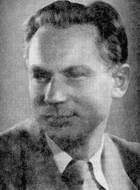- Taras Bulba-Borovets
Vasyl’ Dmytrovych Borovets’ ( _uk. Василь Дмитрович Борове́ць), pseudonym Taras Bulba Borovetz (March 9, 1908, northern
Volhynia ,Russian Empire - May 15, 1981,Toronto ,Canada ) was a Ukrainian nationalist political activist.
thumb|right|Vasyl Borovetz - Taras Bulba-BorovetzDuring the Interbellum, he lead educational programs inVolhynia , and in 1930 the Ukrainian National Renaissance for which he was interned in 1934-35 in the PolishBereza Kartuska Detention Camp . He was an active member of pro-Simon Petlyura movement, which was resentful of Poland for signing theTreaty of Riga . AfterPolish September Campaign , he managed to get to theGeneral Government and inWarsaw got in touch with members of theUkrainian People's Republic , who told him to return to the area ofSarny , which he did in August of1940 .Therefore, after Soviet annexation of Western Ukrainian lands to the Ukrainian SSR Borovets organized the underground anti-Soviet resistance in Volhynia (called "
Poliesia Sich ") and after the German attack on the USSR he organized theUkrainian Insurgent Army UPA also known as the Polissian Sich. It effectively fought against the Soviets and during the German occupation went into underground. From 1943 it became known as the Ukrainian National Revolutionary Army and the insurgency was directed according to the plan of the General Command of theUNR Fact|date=August 2008.In 1943 organized the Ukrainian National-democratic Party. In November 1943 was arrested by the Gestapo in Warsaw and incarcerated in
Sachsenhausen concentration camp . In Autumn 1944 the Nazis, looking for Ukrainian support in the war they were losing against the Soviets, freed Borovets since he never ceased attempts to come to understanding with Nazi against the common enemy, the Soviets. He was put in charge of a formation of the paratroopers brigade to be dropped in the rear of theRed Army and engage in guerrilla warfare. Those plans never came to fruition and in the end of war Ukrainian nationalist allies of Hitler demanded being transferred away from the Eastern Front to be able to surrender to allies. Borovets' detachment surrendered to the allies on May 10, 1945, and were interned inRimini (Italy )Fact|date=August 2008.Some sources blame Bulba for starting
Massacres of Poles in Volhynia . However, there is evidence that he wrote toStepan Bandera in August 1943, that Ukraine had more important enemies than the Poles, and the Polish nation will exist as such, and that the future will determine whether the Poles will be enemies or friends. Bulba criticized the massacres of Poles, calling them shameful (Derz. Archiw Riwnenskoji Oblasti (DARO), f. R-30, op. 2, spr. 113, kk. 103-105).In 1948 he emigrated to Canada. While in emigration he organized the
Ukrainian National Guard and published a newspaper"Mech i Volia" (Sword and Freedom), along with a book of memoirs "Armiya bez Derzhavy" (Army without a country). He died in Toronto, Canada.Sources
* [http://oun-upa.org.ua/personalities/borovets.html Son of Polissia]
* [http://www.geocities.com/uno_montreal/bulba_table.htm Army without country]
* [http://forum.ottawa-litopys.org/documents/doc0303_u.htm Taras Borovetz History of the UIA]
* [http://forum.ottawa-litopys.org/documents/doc0304_u.htm Taras Borovetz - Our opinion of Russia and General Vlasov]
* Володимир Дзьобак. [http://www.ssu.gov.ua/sbu/control/en/publish/article;jsessionid=27653130DBA2F6D57540DF0ABC9CEB02?art_id=43288&cat_id=42967 Тарас Боровець і “Поліська Січ”] , "З архівів ВУЧК-ГПУ-НКВД-КГБ", №1/2(2/3), 1995. LCC|JN6635.A55 I679
Wikimedia Foundation. 2010.
